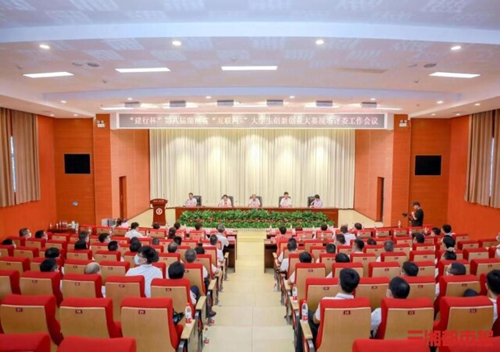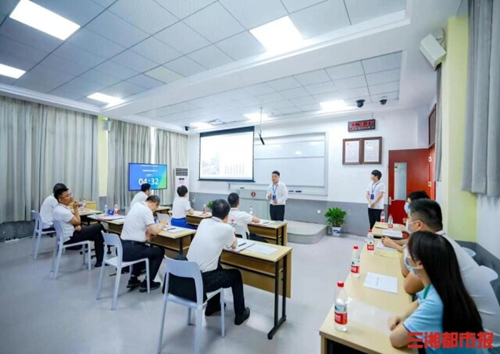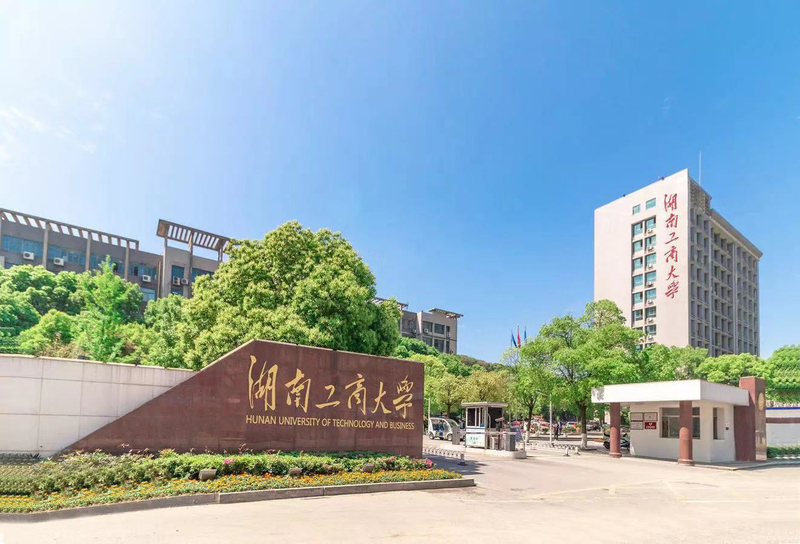[Hunan Today] College Student Innovation and Entrepreneurship Competition Exhibits Creative Combination of Traditional Culture and Technology
2022-07-22
ang Jing, Intern Liu Xiang, and Correspondent Ma Zihan) Supporting rural revitalization with industry, tackling pollution with technological innovation, promoting the inheritance of intangible cultural heritage by integrating innovation into education……during the competition, amid the fusion of national culture and high technology, the contestants share their entrepreneurial experience. On July 21, the provincial competition of the “CCB Cup” 8th Hunan “Internet+” College Students Innovation and Entrepreneurship Competition was held in HUTB. More than 270000 projects from over 130 colleges participated in the competition (including 89423 projects in the higher education main track, 61094 projects in the “red journey” track and 123361 projects in the vocational education track). The contestant number and size reaches a new record high.

The competition tracks are divided into three parts, i.e. 210 college main tracks, 75 “youngsters pursue red dreams” tracks and 75 vocational education tracks. After college competition and online evaluation, 360 projects from 66 colleges entered the provincial competition. The competition will adopt the form of “on-site project exhibition + judges’ questions”, and present 80 first prizes, 100 second prizes and 180 third prizes.

All the participating teams bring a great variety of featured projects to the competition. Our attention is drawn to a student holding a unique medicine box. It is the “Xiangya ‘Yaosanpao’-Technology Empowers Yao Medicated Bath and Supports National Health Development” project from the Central South University (CSU). Li Guihua, the leader of the project, said that the project aims to solve such problems as preventing Yao medicine from lost, building a long-lasting profitable industry chain for Yao people, and realizing rural revitalization and modernization. Relying on the scientific research strengths of Xiangya School of Pharmaceutical Sciences of CSU, the team members worked with the People’s Government of Yao Autonomous County of Jianghua to develop the “Yaosanpao” external lotion. “Yaosanpao” bacteriostatic instant granules has completed the pilot scale test, batch production and marketing, and brought tangible benefits to local villagers. The project supports upstream planting through downstream distribution, actively guides the surrounding peasant households to engage in planting, recovery and processing with the base as the center, and achieves a considerable benefit of average annual income increase of 2 million yuan.

Wearing traditional ethnic costumes and Miao and Dong silver ornaments and holding delicate and complicated carved works……they are from the “Carved Artisan” project group from Changsha Commerce & Tourism College. We learn that the project group selects Jingzhou Carved Preserved Fruits, one of the Hunan state-level intangible cultural heritages, as the subject, and that Lan Yong, the project founder, is one of the 5th batch of inheritors of the heritage. The project group has cooperated with numerous primary and middle schools as well as colleges and universities to pilot the distinctive inheritance mode of “guiding education with intangible cultural heritage”, and opened sculpture interest courses. Talking about the participation experience, Zhao Hanxin, the secretary general of the group, said that it is the second time they participate in such competition (the entrepreneurship competition), and that the group chose the Changde Grinding Tea, another intangible cultural heritage, as the entry in the last competition. He said: “The competition provides a diving platform where we can think outside the box. In the process of simulated entrepreneurship, we have gained valuable knowledge of the market entrepreneurship environment through practice.”
In addition to tradition ethnic projects that support rural revitalization, the competition also exhibits brilliant “cool tech” projects. Liu Yinyin, the leader of the “Leader in Chromium-containing Wastewater Circulation Governance” project group from Hunan Automotive Engineering Vocational College, told us that they employ the lead salt regeneration process to circulate heavy metal wastewater. He added that through innovation in process, equipment and mode, they achieve the triple circulation of heavy metal, chemical raw materials and water, realize the harmless, reduced and resource control, reduce the pollution caused by industrial wastewater, and improve environment, thus attracting investment and stimulating development. Liu Jingcheng, the leader of “A Photocatalytic Material that Effectively Degrades Indoor Formaldehyde” project from Huaihua University, told us that to provide an efficient and clean solution to the increasingly serious problem of indoor decoration pollution, they use a new technology to combine nanometer titanium dioxide with metal organic frameworks (MOFs), which can not only efficiently degrade indoor formaldehyde and other organic pollutants, but also kill pathogenic bacteria.

Lei Guiping, Second-level Inspector of the Department of Education of Hunan Province, stressed the need to evaluate and score projects following the principles of openness, fairness, impartiality and objectivity, select eligible projects for the national competition with a forward-looking vision and professional perspective, and comply with the epidemic prevention and control requirements. He wished all the judges to select excellent, feasible projects, so that more “innovative stars” have an opportunity to acquire new knowledge, exhibit their strengths, achieve practical results and go all out in work, and are able to integrate the vigorous young dream into the great Chinese Dream, and become a major force in innovation and entrepreneurship.
(First review: Huang Jing, Second review: Yuan Xin, Third review: Zhou Wenbo)
Link:https://m.voc.com.cn/wxhn/article/202207/202207212050047192.html









